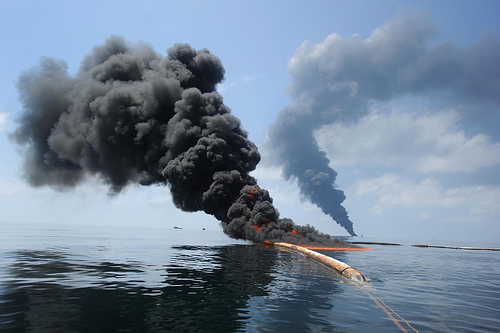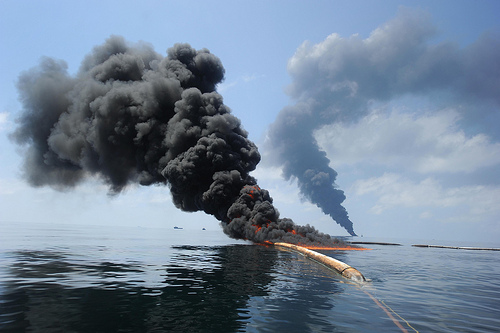 BP isn’t sorry for the Gulf oil disaster, and neither are critics of BP’s report.The reviews are in and they’re not good. Reaction to BP’s report from its internal investigation of the Gulf explosion has been almost all negative. Most critics have ripped BP for placing the bulk of the blame on its partners, but some are also asking what the pattern of mistakes and bad decisions says about how things are done on those huge oil rigs in the ocean.
BP isn’t sorry for the Gulf oil disaster, and neither are critics of BP’s report.The reviews are in and they’re not good. Reaction to BP’s report from its internal investigation of the Gulf explosion has been almost all negative. Most critics have ripped BP for placing the bulk of the blame on its partners, but some are also asking what the pattern of mistakes and bad decisions says about how things are done on those huge oil rigs in the ocean.
Sorry seems to be the hardest word: The AP gets to the heart of the matter through a simple analysis of the lawyer-washed language of BP’s report. It never mentions the words blame, regret, apology, mistake, or pollution. The word fault does show up 20 times, but only once in the same sentence as the company’s name.
Here’s a sampling of other reactions:
Loren Steffy, Houston Chronicle:
If all of this sounds familiar, it should. Today’s Bly Report follows a template established by the Mogford Report, issued a few months after the March 2005 explosion at BP’s Texas City refinery that killed 15 people. That report, too, placed blame far down the management chain, laying it at the feet of contract workers and mid-level managers. Neither report addresses the root causes of the disasters they were supposed to investigate. Neither addresses the broader issues that dictate bigger decisions — such as well design — that were at the forefront of recent investigative hearings by the U.S. Coast Guard and the Bureau of Ocean Energy Management, Regulation and Enforcement.
Terry Macalister, energy editor, The Guardian:
What is really shocking about this report is the catalogue of errors — both human and mechanical. They demolish once and for all the oil industry’s much quoted mantra that “safety always comes first.” It may come first in the board room but it does not down at the wellhead where the real dangers are faced. It is worth remembering that BP, its rig operator Transocean and the main well contractor Halliburton are the blue chip companies in the wider oil and gas sector. If the shoddy work practices highlighted here are what the best-in-class do, then what is happening in the lower reaches of this industry?
Ian Urbina, The New York Times:
Central to BP’s legal strategy will be the need to rebuff claims that the company acted with gross negligence. The difference between gross negligence and negligence for BP, in this case, may be more than $15 billion in additional civil penalties under the Clean Water Act. Toward that end, the report plays down BP’s well design as a factor in causing the explosion.
David Hammer, New Orleans Times-Picayune:
The report stands in stark contrast to the conclusions drawn by independent engineering experts, federal investigators and news reporters based on reviews of available evidence. Those generally found that BP engineers and supervisors chose dubious designs for the well, skipped a crucial test that could have warned them of cementing problems and then misinterpreted the results of a final pressure test before deciding to remove a final barrier against gas flowing up to the rig.
People who need people: While BP is deserving of endless slings and arrows, another easy target — perhaps less deservedly — are the federal inspectors working in the Gulf. Mention their agency by its former name — Minerals Management Services — and you conjure up images of parties and freebies and way-too-cozy relationships. But a new report by Outer Continental Shelf Safety Oversight Board suggests the failings of MMS inspectors may have had more to do with lack of training, resources, and support from their higher-ups than moral turpitude. Jonathan Tilove, writing in the New Orleans Times-Picayune, highlights the board’s findings:
The report found that the Gulf of Mexico district offices don’t have the number of engineers needed to conduct effective permit reviews, that the inspectors lacked formal training and certification, and nearly half, by their own admission, felt ill-trained. The report found that there was little sharing of information among inspectors and between offices — the Gulf inspectors even lacked laptop computers.
Interior Secretary Ken Salazar said yesterday that his agency hopes to hire hundreds of new inspectors. Right now about 60 inspectors are responsible for covering roughly 3,500 drilling rigs and platforms in the Gulf.
No more chasing rainbows: The Senate’s failure to deal with climate legislation has triggered another ripple. Clean Energy Works (CEW), a coalition of 80 environmental, religious, veteran, and labor groups, is closing up shop after its summer of discontent. At one point, the group had 200 field organizers and 45 staffers based in Washington. But with no chance of Congress setting a cap on greenhouse gases, it’s lost its purpose for being. David Di Martino, a spokesman for the group, says CEW was never meant to be more than a temporary organization focused on a specific issue. But when you go back and see what he was saying a year ago, well, you can’t help but be a little wistful. Here’s Di Martino last September:
Public support for clean energy legislation is overwhelming. Unfortunately, an army of special interests and their Washington lobbyists are doing everything they can block comprehensive energy reform. This campaign will mobilize the voices of those millions of Americans who want to put us back in control of our economy, our security, and the future of our planet.
So what have you done this summer? Here’s one of those scientific advances that most of us will never begin to understand. So let’s just lean back and tip our mojitos to the researchers at MIT who’ve been able to get tiny solar cells only a few billionths of a meter wide to mimic plant life by restoring and regenerating themselves. Sounds pretty damn impressive, but the best part is that it means solar cells will be able to last a lot longer. The BBC has the details.
Lights out: The Federal Trade Commission broke new ground yesterday when it sued a California firm, Lights of America, for making misleading promises about its LED bulbs. The company claimed that one of its LEDs could replace a 40-watt incandescent bulb, which emits roughly 400 lumens. Not quite, says the FTC. According to the agency, the bulb produced only 74 lumens of light. It’s the first time the feds have challenged claims about LED bulbs.
Not too much power to the people: And in China, local
officials are taking extreme measures to meet the energy-saving targets set in Beijing. The country’s economy is growing so fast — 10.3 percent last quarter — that the only way local leaders can hope to stay within the central government’s limits on energy usage is to shut down plants for days at a time and order rolling blackouts in industrial areas. One plant manager told the AP that it’s bad enough that his factory can’t deliver on orders because of the shutdowns, but even at home, where water pumps are shut off by the blackouts, “we can’t use the toilet.”
Now that is the unkindest cut.



